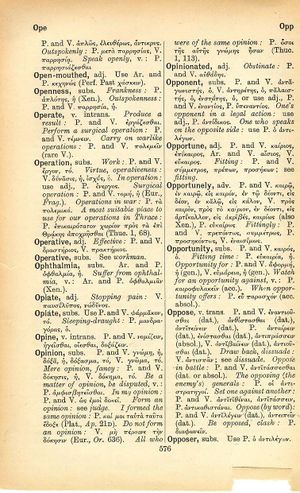opportune: Difference between revisions
From LSJ
Δαίμων ἐμαυτῷ γέγονα γήμας πλουσίαν → Malus sum mihimet ipse Genius, ducta divite → Ich stürzt' mich selbst ins Unglück durch die reiche Frau
(6_11) |
(D_6) |
||
| Line 6: | Line 6: | ||
{{Lewis | {{Lewis | ||
|lshtext=<b>opportūnē</b>: adv., v. [[opportunus]]. | |lshtext=<b>opportūnē</b>: adv., v. [[opportunus]]. | ||
}} | |||
{{Gaffiot | |||
|gf=<b>opportūnē</b>¹² <b>(ōport-</b> Cic.<b>)</b>, à [[propos]], à point, à temps : Ter. Ad. 81 ; Cic. Nat. 1, 16 ; Fin. 5, 8 ; Cæs. G. 4, 22, 2 || -nĭus [[Gaius]] Inst. 2, 97 || issime Cæs. C. 3, 101. | |||
}} | }} | ||
Revision as of 06:59, 14 August 2017
English > Greek (Woodhouse)
adj.
P. and V. καίριος, ἐπίκαιρος, Ar. and V. αἴσιος, V. εὔκαιρος. Fitting: P. and V. σύμμετρος, πρέπων, προσήκων; see fitting.
Latin > English (Lewis & Short)
opportūnē: adv., v. opportunus.
Latin > French (Gaffiot 2016)
opportūnē¹² (ōport- Cic.), à propos, à point, à temps : Ter. Ad. 81 ; Cic. Nat. 1, 16 ; Fin. 5, 8 ; Cæs. G. 4, 22, 2

